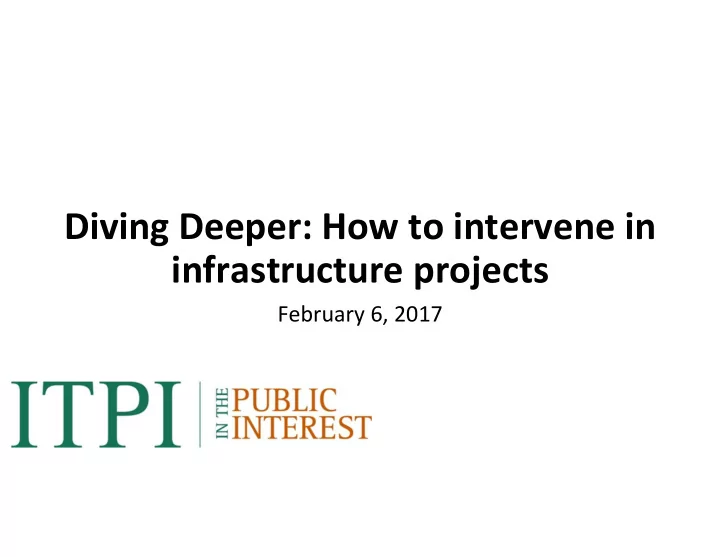

Diving Deeper: How to intervene in infrastructure projects February 6, 2017
Agenda • How to intervene in P3 deals • Understanding existing financial obligations and financing schemes • Advocating for community benefits • Resources • Questions
Why Intervene? • Lots of talk about Trump’s plan, but infrastructure decisions are still made by local and state governments • Advocates can: • Stop bad deals • Turn bad deals into good deals • Improve deals to ensure community benefits
How to Intervene
Know the Basics • Identify existing infrastructure needs and plans in your region • Know the applicable law • Understand enabling legislation/local policy • Know the federal funding and financing and “strings” attached • Understand existing financial obligations, constraints and funding streams
Track and monitor proposals • Ear to the ground - You have to know what’s coming • The earlier the better! • Ask the right questions • See ITPI’s Guide: Understanding and Evaluating Infrastructure Public-Private Partnerships (P3s) • Why is private equity financing being considered for the project in lieu of traditional public financing? Has traditional public financing been considered? • What will be the potential impacts on the existing and/or future workforce, including both the construction workforce and the long-term operations and maintenance workforce? • If the asset has an associated user fee, what rights does each party have with regard to rate setting and rate increases?
Monitor the process and players and weigh in at each step • Process: • Procurement choice • Value for Money • RFI - soliciting interest • RFQ • RFP • Identify and analyze the proposed financing schemes • Research and track bidders
Understanding existing financial obligations and financing schemes Carrie Sloan of ReFund America Project
Facing Privatization? Look for existing financial obligations • Predatory Wall Street Deals often at the Root of high debt levels and rising costs • Privatization as the “solution” or only real option
Interest Rate Swaps • Risky derivative add-on to variable rate bonds as “insurance” against rising interest rates • Long contracts with high termination penalties • Banks didn’t adequately disclose risks • Backfired: extremely costly for issuers
Auction Rate Securities • Variable rate bond • Paired with swaps • Banks didn’t disclose risks • Banks misrepresented market • Backfired: extremely costly for issuers
Swaps and Auction Rate Securities • Banks and advisors collected huge fees to put deals together • Cities, etc didn’t understand deals • Banks violated federal rules on disclosure of risk • Banks manipulated interest rates • Financial disaster for bond issuers • Lawsuits, SEC fines
Toxic Deals at the Root of Financial Crisis • Mass water shut-offs and tax lien foreclosures in Detroit and Baltimore, & privatization schemes • Shut offs in Pittsburgh, partial privatization, lead in water, boil water alerts, lawsuits • Indianapolis: huge rate increases, privatization, water quality problems
Pittsburgh Water and Sewer (PWSA) • City officials/PWSA didn’t understand deals • Huge paycheck for banks and advisors • Advisor conflict of interest • $113 million swaps payday for banks, $87 mil penalty • Management contract with Veolia: skyrocketing rates, overcharging, lead in the water, boil water orders, lawsuits
Detroit • Swaps contributed to bankruptcy • $537 million in fees to terminate water swaps • Huge rate increases = ½ of bills to swaps. • Rationalization for Flint detaching and for privatization scheme
DETROIT INTERVENTION AND VICTORY
Research the Deals and Investigate Your Options • Did banks/advisors violate rules or break laws? • Were there conflicts of interest? • Did officials understand the deals? Were banks misleading?
Watch out for: Rate Securitization and Similar Schemes • Automatic rate increases to pay investors • Minimum revenue guarantees for investors • Tax levies built into contracts • Other schemes that shift risk to taxpayers, away from investors and take power away from electeds/public servants
Finding and Fighting Bad Deals- RAP Can Help • Trainings • Research Guides • Resources and reports: www.refundproject.org • Contact: Csloan@rooseveltinstitute.org
Advocating for Community Benefits in Infrastructure Projects Ben Beach, Legal Director Partnership for Working Families | 2.6.2017
What are “Community Benefits”?
What are “Community Benefits”?
Lots of Paths Government Agreements Private Community Benefits Agreements Ordinances and Policies Land Use Planning Shared Resources
Three Core Principles Accountability Meaningful Benefit Democratic Participation
Oakland Army Base Community Benefits Cooperation Lease Agreement Oversight Commission REVIVE OAKLAND
Hurricane Sandy Rebuild Date as of January 23, 2017 Cumulative Jobs for Sandy Residents Build it Back Direct 823 Hires (Local) Hires through Sandy Recovery Workforce1 Community Benefits Metrics with Build it Back 63 16% of all Employers Build it Back Lobbying Local Law Hires to-date with Other 306 are Sandy Employers Impacted Residents Pre- apprenticeship Union 115 Placements Sandy Recovery 484 Workforce1 Subtotal Grand Total 1,307
Indianapolis Criminal Justice Center Lobbying P3 Agreement Community Benefits Agreement
Useful Resources General P3 Resources • Brand New from ITPI! A Guide to Understanding and Evaluating Infrastructure Public-Private Partnerships • Infrastructure Justice: Building Equity into Infrastructure Financing • Public Infrastructure as Stealth Privatization, The American Prospect Community Benefits Resources • Building America While Building Our Middle Class • Community Benefits Toolkit Toxic Financial Deals • Riding the Gravy Train (info on transit swaps) • How Wall Street Caused a Water Crisis in America’s Cities, The Nation
Contact Info Donald Cohen Ben Beach In the Public Interest Partnership for Working Families Donald@inthepublicinterest.org ben@forworkingfamilies.org Shar Habibi Carrie Sloan In the Public Interest ReFund America Project shabibi@inthepublicinterest.org csloan@rooseveltinstitute.org
Recommend
More recommend